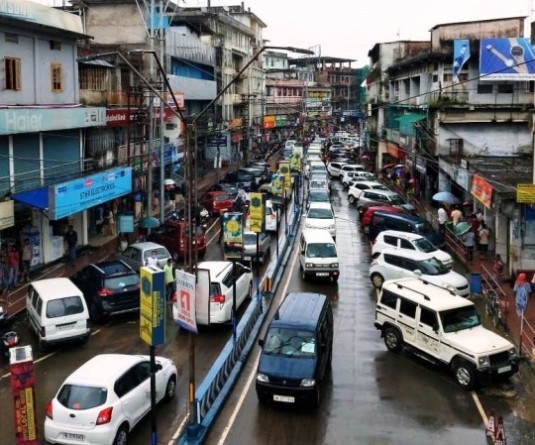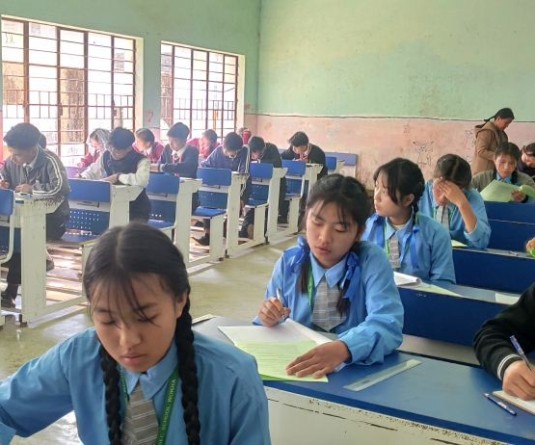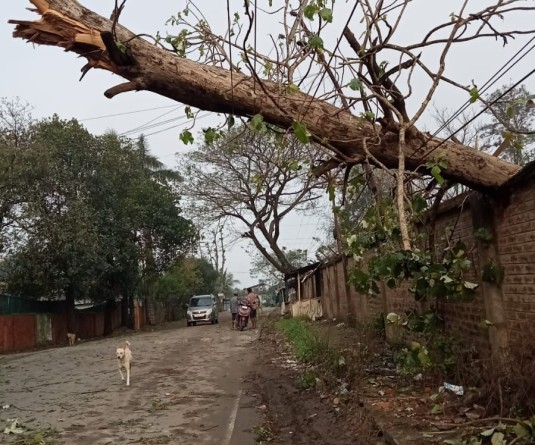
Our Correspondent
Kohima | October 6
A one day orientation training programme on ‘Rehabilitation of Persons with Disabilities’ under the aegis of Ali Javar Jung National Institute for Speech & Hearing Disabilities (Divyangjan), Mumbai, (DEPwD, Ministry of Social Justice & Environment, Government of India) in collaboration with Department of English, Nagaland University, Kohima Campus, Meriema took place on October 5 at NU Kohima Campus Meriema.
Speaking on the occasion as the chief guest, Prof. Buno Liegise, Dean of School of Humanities & Education and in-charge of Nagaland University, Kohima Campus Meriema said that a cursory look at the general attitude of people in the Naga Society towards children/persons with disabilities is that of compassion and protection.
“The differently-abled are not usually treated with disdain or cruelty,” she said. Naga society has since time immemorial recognized the right to life of these children with special needs. Hence, it is considered wrong to mistreat or abuse such children. On another front, families of the disabled are very protective of children with disabilities.
Parents often hesitate to take such children to public gatherings or public places for fear of humiliation or/and stigma. And by and large, they would rather take care of such children in their homestead. The physical and biological needs - of food, clothing and shelter - of these children are taken care of in the home. However, their intellectual and mental developments as well as the emotional and social requirements are often left unattended.
She said lack of knowledge on the psychological makeup and their intellectual and emotional development of children with disabilities remains a barrier in providing appropriate education and training of such children. “In this way, there is a glaring gap in the socialization of children with disabilities in the state,” she said.
She said environment in public services/places such as transport and communication, educational institutions, Government offices, hospitals and hotels are not disabled friendly. Much still have to be done to develop an eco system that is congenial for the persons with disabilities to live happily in the society.
Regarding state machinery providing for the disabled children, the Department of Social Securities and Welfare provides financial assistance to organizations working for the different categories of persons with disabilities and has a handicapped scholarship scheme. There is also the State Coordination Commission. Besides, there is a separate Cell in the Directorate of School Education. The initial work of this cell was to train teachers and make assessment of disabled children in the state, and following the assessment several aids were extended to the identified children such as uniform allowance, books and stationery grants, special aids - spectacles, hearing aids, crutches and wheel chairs, readers and escort allowance etc.
A report on Integrated Education of Disabled by the IED Cell showed that a slew of programs had been take up via SSA scheme - such as workshops, teacher training, parental counselling, awareness camps, residential and non residential bridge courses through NGOs, home-based education and foundation course where teachers were trained. She also said today as a result of the central government flagship programs such as the SSA, RMSA and the Right to Education Act 2009, schools are opening their doors to enroll children with special needs.
“It is important for the state to strengthen the efforts of institutions and schools as they foray into this relatively new initiative,” she said.
In the state of Nagaland, the role played by the private individuals and NGOs in this field cannot be ignored. Some of the NGOs/institutions contributing for the cause of children/persons with disabilities included; The Deaf Biblical Ministry, Welfare Society for the Handicapped People, Spastic Society of Nagaland, The Nagaland Blind Association, Northern Angami Handicap Union, Hope Centre, The Prodigals Home, and more recently the Jo Foundation and the Enable etc.
“It is for all stakeholders to come together and work to ensure a better, brighter future for the people with disabilities,” she said. She also stated that a clarion call may be given to faculty, staff and post graduate students of the University to step out of our comfort zone, step out in faith, to help children with special needs in whatever way or form. These children also have talents and potentials, they only need to be understood and facilitated to develop their 'fullest and best self', Prof. Liegise added.
Also speaking on the occasion as guest of honour, Prof. N. Venuh, Dean, School of Social Sciences stressed on the need to support and treat the differently abled persons equally. “We should not isolate or look them down,” he said adding that we have to encourage them in whatever way.
He also stressed on the need to take care of them, so that in return they will contribute to the society. The resource persons of the programme included Indranil Chatterjee, faculty, AYJNISHD, ERC, Kolkata, Dr. Prosenjit. Majumdar, social welfare officer, ERC, Kolkata and Saikat Das, lecturer, Special Education, AYJNISHD, ERC, Kolkata.
Earlier, Prof. Nigamananda Das, Head of Department of English, NU delivered welcome address while Dr. Rosemary Dzuvichu, director, Women Studies Centre, NU chaired the inaugural session.
Role of Nagaland University in regard to addressing the “glaring gap in the socialization of children with disabilities in the state:”
(i) Creating awareness among the people on the issues and challenges confronting children with special needs in the society and what the society can do to ameliorate their problems (ii) Design study material and course structure for preparation of teachers who would be teaching and handling the differently-abled children in the schools (iii) Conduct refresher courses /training and orientation programs for schools teachers and special educators (iv) Organise interface programs with community / tribal leaders to disseminate information and knowledge on rehabilitation avenues, welfare schemes and legal provisions etc (v) Teach courses on inclusive education at the bed, med level and ma education, which are already existing (vi) Introduce a separate full- fledged department in the university - 'department of disabilities studies' (vii) Engage in research projects on all categories of disabilities in the state and suggest policy measures and program of actions to improve conditions for these children/persons.





